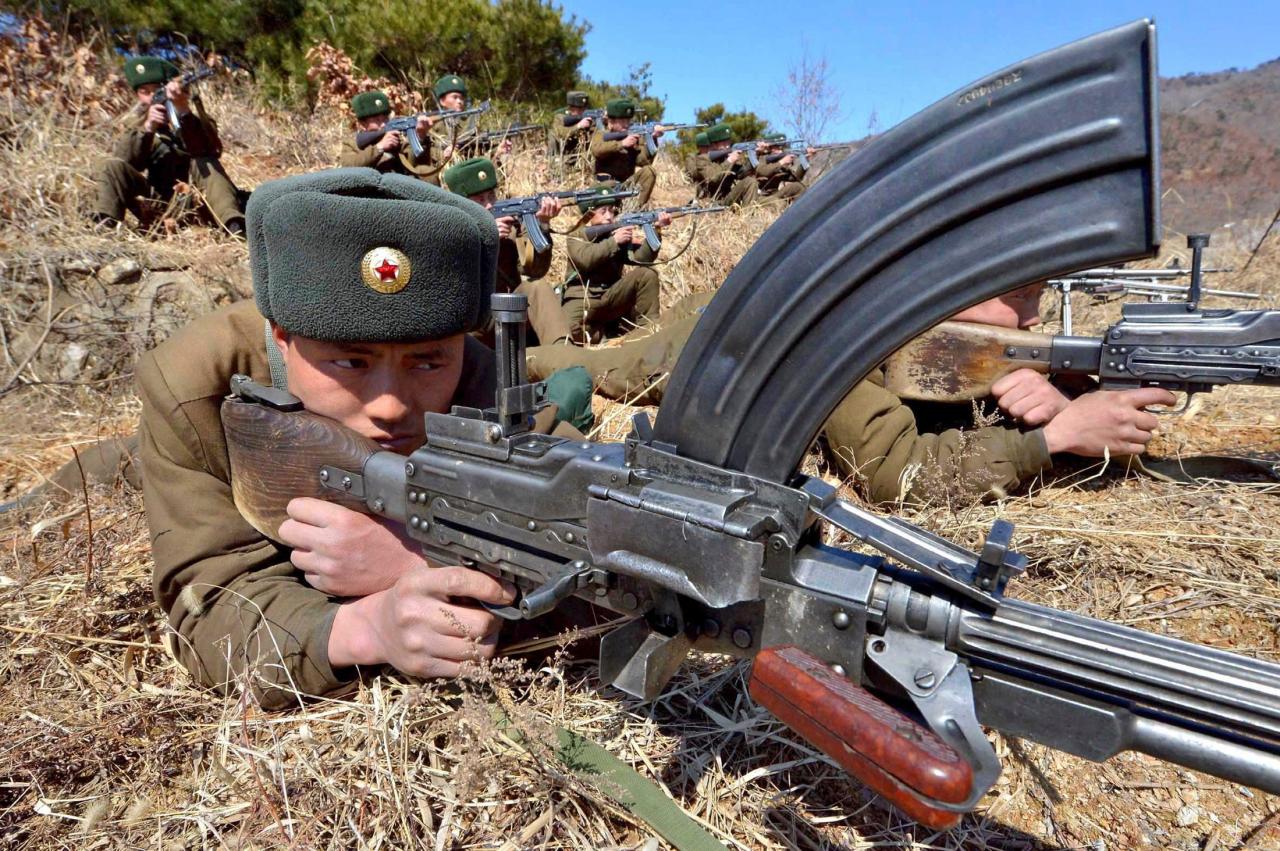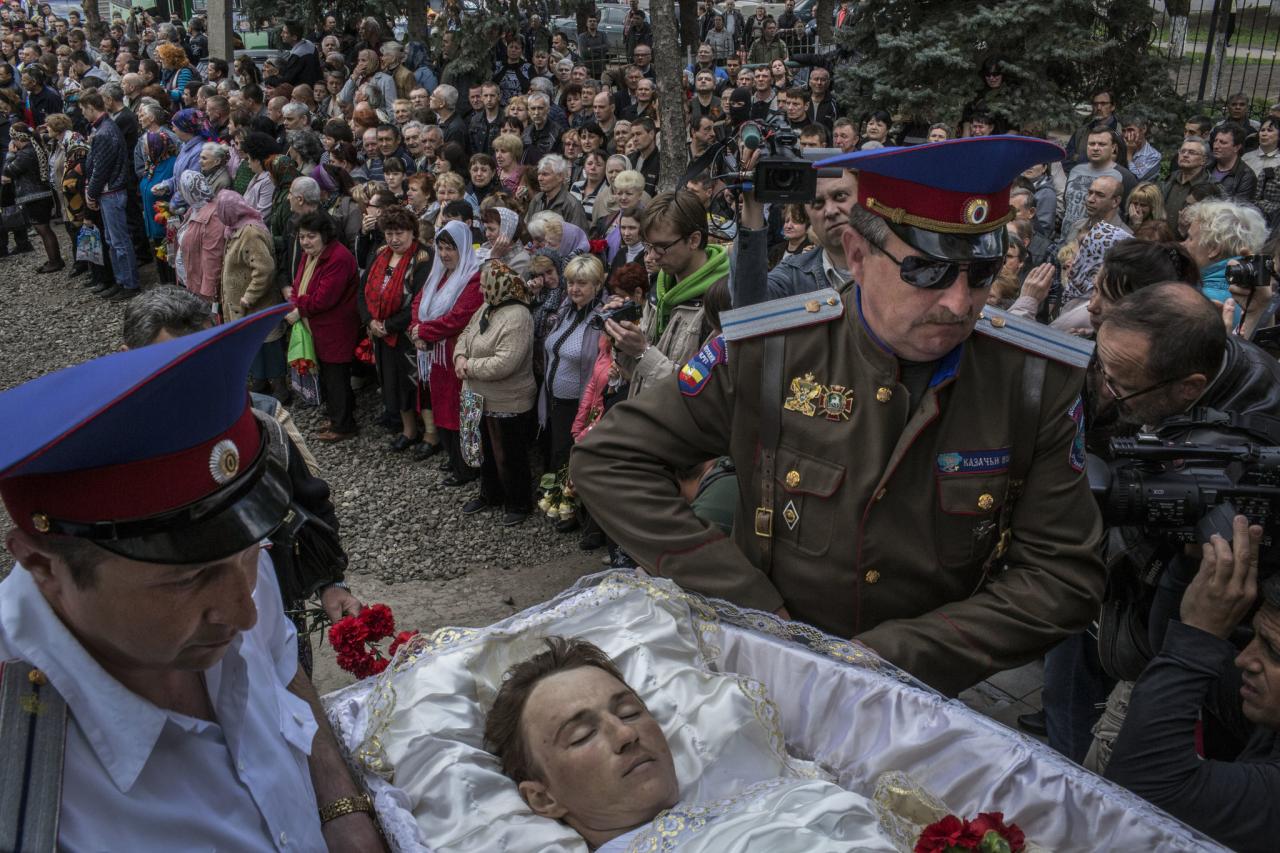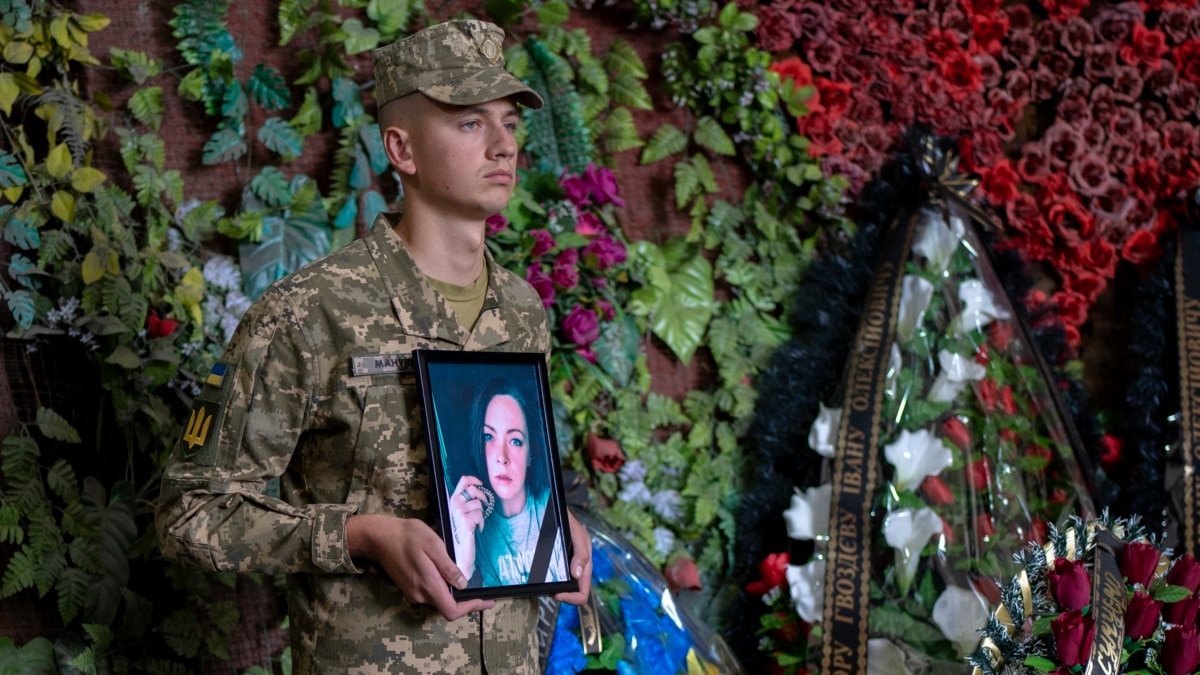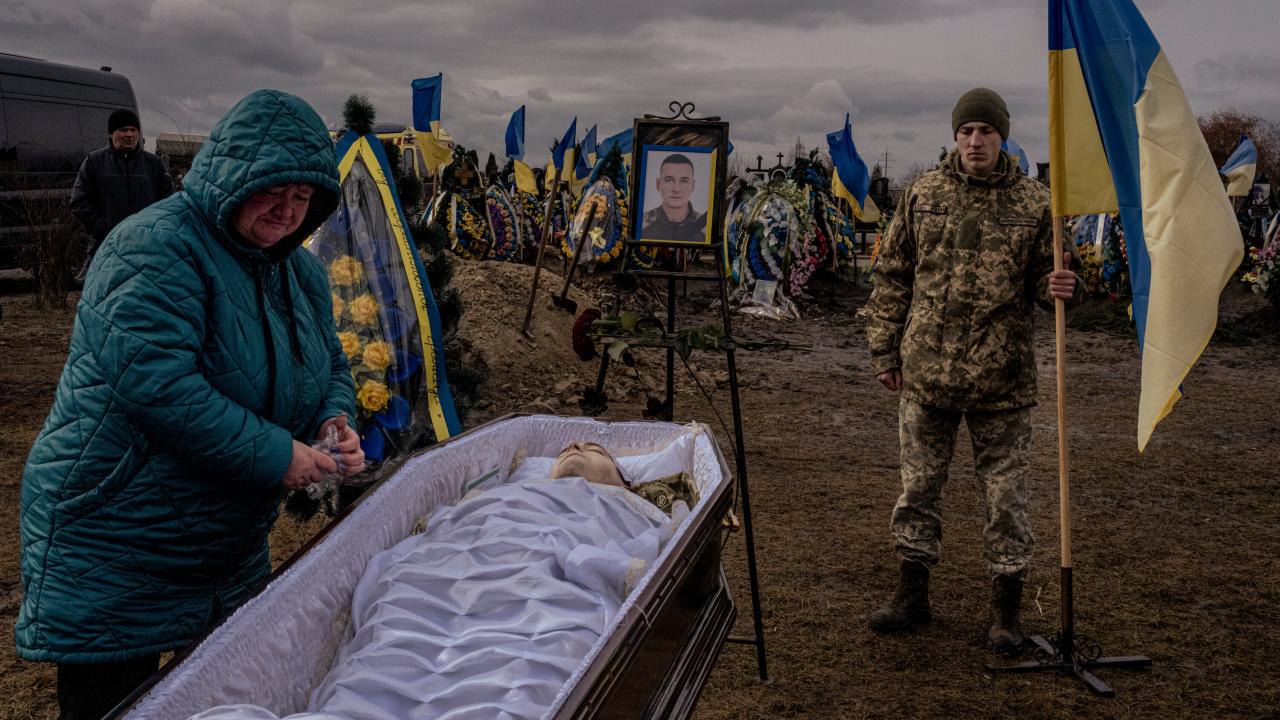North Korean soldier captured in Ukraine dies: reports are surfacing, sparking a whirlwind of speculation and geopolitical intrigue. This unexpected development throws a spotlight on the complex web of international conflict and the often-unseen players involved. The circumstances surrounding the soldier’s capture, his identity, and the cause of his death remain shrouded in mystery, raising questions about his motivations for being in Ukraine, the potential implications for international relations, and the challenges of verifying information amidst the ongoing war.
We’ll explore potential scenarios for his presence in Ukraine – was he a defector, a mercenary, or something else entirely? We’ll delve into the difficulties of confirming his identity given the secretive nature of the North Korean military, and examine the various ways his death might impact global politics, from the ongoing conflict to international efforts to curb North Korea’s nuclear ambitions.
We’ll also consider how different media outlets might frame this story and the potential biases that could emerge.
The Circumstances of Capture
The death of a North Korean soldier captured in Ukraine presents a complex and unusual situation, raising many questions about his presence in the conflict zone and the circumstances leading to his capture and subsequent death. Understanding this requires exploring several potential scenarios.The soldier’s capture could have resulted from a number of factors. It’s plausible he was part of a larger contingent of North Korean soldiers deployed to Ukraine, perhaps secretly, to support Russian forces.
Alternatively, he might have been captured while attempting to desert or defect from a Russian unit. Another possibility, though less likely, is that he was captured independently, possibly as a mercenary or through other means unrelated to organized military deployment. The exact circumstances remain unclear pending further investigation.
Geopolitical Implications of North Korean Involvement in Ukraine
The presence of North Korean soldiers in Ukraine carries significant geopolitical weight. It represents a potential escalation of the conflict, drawing in another state and complicating international relations. This involvement could further strain relations between North Korea and the West, particularly the United States and its allies. It also raises questions about the extent of North Korean cooperation with Russia and the potential for future military collaborations between the two countries.
The incident highlights the global reach of the Ukraine conflict and its potential to draw in unexpected actors. Such involvement could lead to international sanctions or diplomatic pressure on North Korea.
Potential Motivations for North Korean Military Personnel in Ukraine
Several motivations could explain a North Korean soldier’s presence in Ukraine. He may have been coerced or incentivized by the North Korean government to fight alongside Russian forces, possibly in exchange for financial compensation or other benefits. Alternatively, he may have been misled about the true nature of his deployment. It is also possible that he volunteered for the conflict, driven by ideological reasons or a desire for adventure or financial gain, although this seems less probable given the authoritarian nature of the North Korean regime and the limited information available to its citizens.
So, a North Korean soldier captured in Ukraine reportedly died, which is pretty grim news. It’s a stark contrast to lighter headlines, like the news that ‘The Batman’ Sequel Heads To 2027, Tom Cruise & Alejandro G , which is, you know, way less depressing. Getting back to the serious stuff, the circumstances surrounding the soldier’s death are still unclear.
Another possibility, though speculative, is that he was part of a clandestine operation with a specific objective beyond direct combat. The lack of transparency from all parties involved makes definitive conclusions challenging.
The Soldier’s Identity and Background

The death of a North Korean soldier captured in Ukraine raises significant questions about his identity and the circumstances leading to his presence in a far-off conflict. Establishing his true identity presents unique challenges due to the opacity surrounding the North Korean military and the limited information available publicly. We can, however, construct a plausible profile based on common patterns of North Korean military service and the realities of mercenary recruitment.The difficulties in verifying the soldier’s identity stem from the highly secretive nature of the North Korean military.
Official records are virtually inaccessible to outsiders, and defectors often lack complete or accurate information about their comrades. Verifying details like rank, unit assignment, and service history requires corroborating evidence from multiple sources, a task complicated by the lack of transparency and the inherent distrust surrounding North Korea. Any information obtained would need rigorous verification to avoid misidentification or the spread of misinformation.
Hypothetical Soldier Profile
Let’s hypothesize that the soldier was a Private First Class (PFC), a relatively low rank common among those sent on foreign deployments. His specialty might have been infantry, given the prevalence of ground troops in conflicts. He likely had several years of service, perhaps five to seven years, sufficient to acquire basic combat skills and experience. This timeframe is a common length of service before a soldier might be considered for external assignments, either through official channels or informal recruitment.
This estimate is based on the typical structure and duration of North Korean military service, though significant variations are possible. For example, he could have been a specialist in artillery or other military occupational specialty (MOS) depending on the demands of his recruiters.
Potential Journey from North Korea to Ukraine
The soldier’s journey from North Korea to Ukraine likely involved several stages. He might have been recruited through informal channels, perhaps by brokers who target financially desperate individuals or those seeking escape from harsh living conditions within North Korea. These brokers might have promised significant financial compensation, far exceeding what he could earn at home, incentivizing participation in the conflict.
The route could have involved transit through China, Russia, or other countries, potentially using falsified documents or relying on human smuggling networks. The process could have been clandestine and dangerous, with the soldier having limited awareness of the ultimate destination or the true nature of the conflict. His travel would have been guided by his recruiters, who would likely have controlled his movements and provided necessary documentation or assistance at each step of the journey.
This would be consistent with the known methods employed by various mercenary recruitment networks globally.
The Cause of Death
Determining the exact cause of death for the North Korean soldier captured in Ukraine requires careful consideration of several factors. The circumstances surrounding his capture, his reported health prior to capture, and the overall conditions in the conflict zone all play a role in any potential explanation. We will explore several plausible scenarios, assessing their likelihood based on available (or hypothetical) information.
Plausible Scenarios for Cause of Death
Several possibilities exist regarding the cause of death. These range from direct combat-related injuries to illnesses exacerbated by the harsh conditions of war and captivity. Analyzing these scenarios helps us understand the most probable explanation.
| Scenario | Likelihood | Supporting Evidence (Hypothetical) |
|---|---|---|
| Combat-related injuries (e.g., gunshot wound, shrapnel injuries) | High | Reports of intense fighting in the area of capture; evidence of gunshot wounds or shrapnel found during autopsy (hypothetical). Similar cases of soldiers dying from combat injuries are common in war zones. For example, the high casualty rates reported in the Battle of Debacle show the prevalence of combat deaths. |
| Illness or disease (e.g., infection, malnutrition, pre-existing condition) | Moderate | Reports of poor sanitation and limited medical resources in the area; evidence of infection or malnutrition during autopsy (hypothetical). The stress of captivity and lack of proper medical care could easily worsen existing health problems. For instance, a soldier suffering from tuberculosis prior to capture might have succumbed to the disease due to the lack of treatment. |
| Accidental death (e.g., accidental injury, suicide) | Low | Lack of clear evidence suggesting an accident or intentional self-harm; no eyewitness accounts or physical evidence supporting this scenario (hypothetical). While possible, this scenario lacks supporting evidence and is less likely compared to combat-related injuries or illness. The lack of reported incidents of this nature within similar circumstances makes it less probable. |
| Other unforeseen circumstances (e.g., exposure, poisoning) | Low | Requires specific evidence of exposure to extreme weather conditions or toxic substances; no such evidence is currently available (hypothetical). This scenario is less likely unless specific evidence points to such a cause. For example, accidental poisoning would require confirmation through toxicology reports. |
International Reactions and Implications
The death of a North Korean soldier captured in Ukraine has the potential to significantly impact international relations, particularly given the already complex geopolitical landscape surrounding the ongoing conflict. The incident raises questions about North Korea’s involvement in the war, the treatment of prisoners of war, and the broader implications for regional stability and nuclear non-proliferation efforts. Several key players will likely respond in ways that reflect their own national interests and priorities.The death itself, regardless of the circumstances, provides fertile ground for diplomatic maneuvering and potential escalation.
The lack of transparency surrounding the situation further complicates matters, leaving room for speculation and mistrust among involved parties. This uncertainty is likely to be exploited in various ways by different actors on the world stage.
Reactions from Key International Actors
The responses from North Korea, Ukraine, Russia, and the United States will likely differ considerably. North Korea may deny any involvement or downplay the significance of the soldier’s death, potentially using it as propaganda to reinforce its narrative of external threats. Ukraine might use the incident to highlight Russia’s alleged use of foreign mercenaries and potentially request further international support.
Russia, depending on the circumstances of the soldier’s death, might attempt to distance itself from the event or use it to bolster its claims about the West’s alleged interference in the conflict. The United States, meanwhile, will likely leverage the situation to emphasize the dangers of North Korea’s weapons programs and its support for authoritarian regimes. For example, the US might use this event to strengthen its calls for increased sanctions against North Korea or to further justify its military presence in the region.
Implications for the Ukraine Conflict and Geopolitical Relations
The incident could further complicate the already fraught situation in Ukraine. The revelation of North Korean involvement, even if limited, could embolden other nations to provide support to either side, potentially escalating the conflict. Furthermore, it could affect the negotiations for a peaceful resolution, introducing a new layer of complexity to the diplomatic efforts. On a broader geopolitical scale, this event underscores the interconnectedness of global conflicts and the potential for seemingly isolated incidents to have far-reaching consequences.
The incident might serve as a reminder of the need for international cooperation in addressing global security challenges. For instance, the situation could strengthen calls for greater transparency and accountability regarding the use of foreign mercenaries in armed conflicts.
Impact on International Efforts to Address the North Korean Nuclear Program, North Korean soldier captured in Ukraine dies: reports
The death of the North Korean soldier could indirectly impact international efforts to address North Korea’s nuclear weapons program. Depending on the reaction of the international community, it could strengthen or weaken the resolve to maintain sanctions or pursue diplomatic engagement with Pyongyang. A strong, unified response could potentially put more pressure on North Korea to comply with international norms.
Conversely, a fragmented or weak response could embolden North Korea to continue its nuclear development and potentially pursue other aggressive actions. The situation might also prompt a reassessment of international strategies aimed at denuclearizing the Korean Peninsula. For example, it could lead to increased intelligence gathering efforts to monitor North Korea’s activities and prevent further involvement in foreign conflicts.
Media Coverage and Public Perception: North Korean Soldier Captured In Ukraine Dies: Reports

The death of a North Korean soldier captured in Ukraine presents a complex story with significant potential for varied and potentially biased media coverage. The event intersects geopolitical tensions, military conflict, and human rights concerns, leading to diverse interpretations and reporting styles across different news outlets.Different media outlets will likely frame this story through their own pre-existing lenses and target audiences.
News of a North Korean soldier captured in Ukraine dying is grim, highlighting the complexities of global conflict. It makes you think about the financial ramifications of such events, especially for those involved, and how regulations impact them. For example, understanding the tax implications of cryptocurrency transactions is crucial, which is why checking out this guide on Understanding The New IRS DeFi Broker Tax Regulations is a good idea.
The soldier’s death sadly underscores the far-reaching consequences of war, impacting individuals in unexpected ways.
This can lead to stark differences in how the narrative is constructed and the emphasis placed on certain aspects of the event. The inherent complexities of the situation, coupled with the limited information often available in such circumstances, create an environment ripe for misinterpretations and the spread of misinformation.
Potential Media Portrayals
State-run media outlets in North Korea, if they choose to report on the incident at all, will likely downplay or completely omit any negative aspects. They might portray the soldier as a victim of Western aggression or emphasize his supposed loyalty to the regime. Conversely, Western media outlets might focus on the humanitarian aspect of the story, highlighting the soldier’s plight as a captive in a foreign war and questioning the ethical implications of his capture and subsequent death.
Pro-Russian media might frame the story within the broader context of the Ukraine conflict, potentially portraying the soldier’s death as a consequence of Ukrainian or Western actions. Finally, some outlets may focus on the geopolitical implications, examining the potential impact on relations between North Korea, Russia, and Ukraine.
Potential Biases and Perspectives
Several biases could influence reporting. Nationalistic biases could lead outlets to favor narratives that align with their country’s interests. Ideological biases might shape the portrayal of the soldier’s background and motivations, potentially casting him as a victim of propaganda or a willing participant in the conflict. Furthermore, the availability of reliable information will influence reporting; lack of access to official statements or eyewitness accounts could lead to speculation and the amplification of rumors.
Finally, the desire to capture audience attention could lead to sensationalized reporting, potentially overlooking crucial details or focusing on emotional aspects over factual accuracy.
Hypothetical News Report
Headline: North Korean Soldier Dies in Ukrainian Captivity Body: A North Korean soldier, whose identity remains undisclosed pending notification of next of kin, has died while in Ukrainian custody. The circumstances surrounding his death are currently under investigation. Ukrainian officials have stated that the soldier was captured during fighting in eastern Ukraine and that his death is not suspected to be the result of foul play.
However, the exact cause of death has not yet been publicly released, pending the completion of an autopsy. The soldier’s capture and subsequent death have raised questions about the involvement of North Korean nationals in the Ukraine conflict and the potential for further escalation of geopolitical tensions. International organizations are calling for a transparent investigation into the soldier’s death, emphasizing the importance of respecting international humanitarian law and ensuring accountability.
While some media outlets have speculated on the soldier’s motivations and potential links to Russian forces, it is crucial to avoid premature conclusions until more information is available. This report will be updated as further details emerge.
Visual Representation of the Narrative

Imagining the journey of a North Korean soldier to Ukraine requires considering the immense physical and psychological hurdles involved. This wasn’t a simple trip; it was a clandestine escape from a totalitarian regime, followed by a perilous journey across numerous borders, likely involving bribery, deception, and constant fear of discovery.The visual narrative begins with a grainy, almost indistinct image of a young man in drab, worn clothing, blending into the muted tones of a North Korean landscape.
So, we’ve got news about a North Korean soldier captured in Ukraine dying, pretty grim stuff. It’s a stark contrast to the lighter news, like the Detroit Tigers adding some infield depth with Torres – check out the details here: Tigers add Torres to infield mix on 1-year deal. It’s a reminder that while sports offer a welcome distraction, serious global events continue unfolding simultaneously.
He is anonymous, a nameless cog in a vast, oppressive machine, yet his eyes hold a flicker of defiance, a yearning for something beyond the confines of his existence. His escape likely involved traversing treacherous terrain, possibly crossing rivers at night, relying on the kindness (or self-interest) of strangers. The journey is fraught with uncertainty, every border crossing a gamble, every encounter a potential betrayal.
He is constantly looking over his shoulder, haunted by the specter of recapture and the unimaginable consequences. The landscapes shift from the familiar, impoverished scenery of North Korea to the increasingly unfamiliar and potentially hostile environments of other countries, the ever-present threat of arrest looming large. The clothes are increasingly ragged, the face thinner, reflecting the hardships endured.
The Soldier’s Final Moments
Picture a dimly lit room, perhaps a makeshift hospital or a hastily constructed field clinic. The air is thick with the smell of antiseptic and something else – the faint, metallic tang of blood. The soldier lies on a cot, his breathing shallow and labored. His face, though pale and etched with exhaustion, holds a surprising serenity, a quiet acceptance.
He is surrounded by unfamiliar faces – some offer comfort, others look on with a mixture of pity and curiosity. There is a stillness in the room, punctuated only by the rhythmic beeping of a heart monitor, a counterpoint to the soldier’s ragged breaths. The weight of his journey, his escape, his experiences in a war far from home, seems to rest lightly upon him now, replaced by a profound weariness.
He is not alone, yet in his final moments, a sense of profound isolation pervades the scene, a loneliness born of exile and the vast distance from his homeland.
Concluding Remarks

The death of a North Korean soldier in Ukraine, while seemingly a single event, ripples far beyond the battlefield. It highlights the unpredictable nature of global conflict and the interconnectedness of seemingly disparate events. The lack of clear information underscores the challenges of navigating truth amidst wartime propaganda and the inherent difficulties of verifying information from conflict zones.
The mystery surrounding this soldier’s presence and demise serves as a potent reminder of the complexities of modern warfare and its far-reaching consequences.
FAQ Overview
What are the potential motivations for a North Korean soldier to be in Ukraine?
Several possibilities exist, including forced conscription into a Russian-backed mercenary group, voluntary participation as a mercenary for financial gain, or even desertion and subsequent involvement in the conflict.
How likely is it that the reports are accurate?
Verification is difficult due to the ongoing conflict and the secretive nature of the North Korean military. Independent confirmation from multiple reliable sources is needed before definitive conclusions can be drawn.
What impact could this have on North Korea’s nuclear program?
The event’s direct impact is uncertain. However, it could indirectly influence international relations and pressure on North Korea, potentially affecting future negotiations regarding its nuclear capabilities.